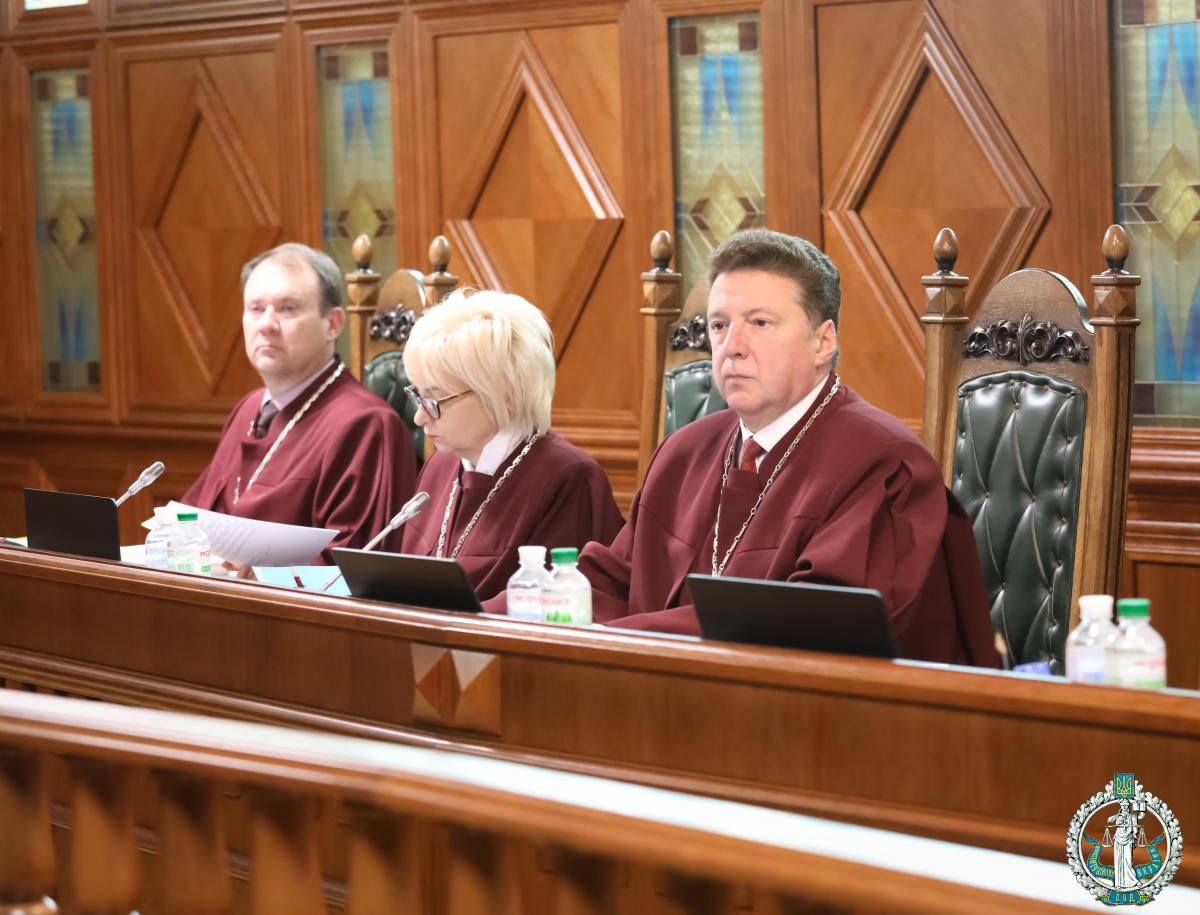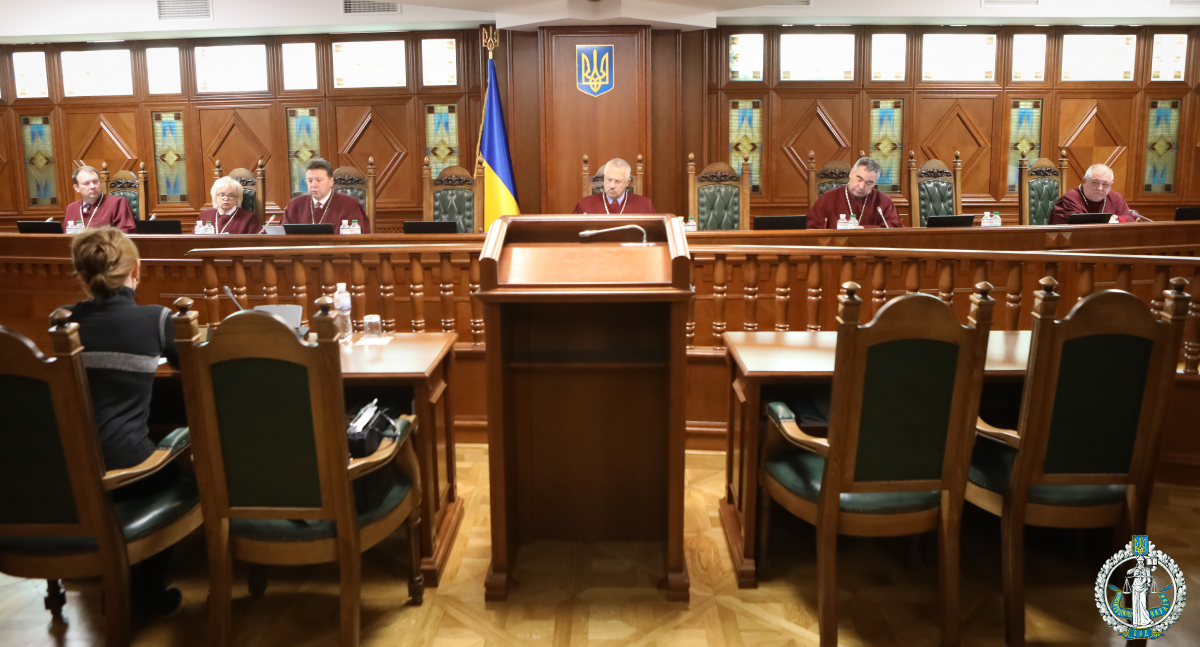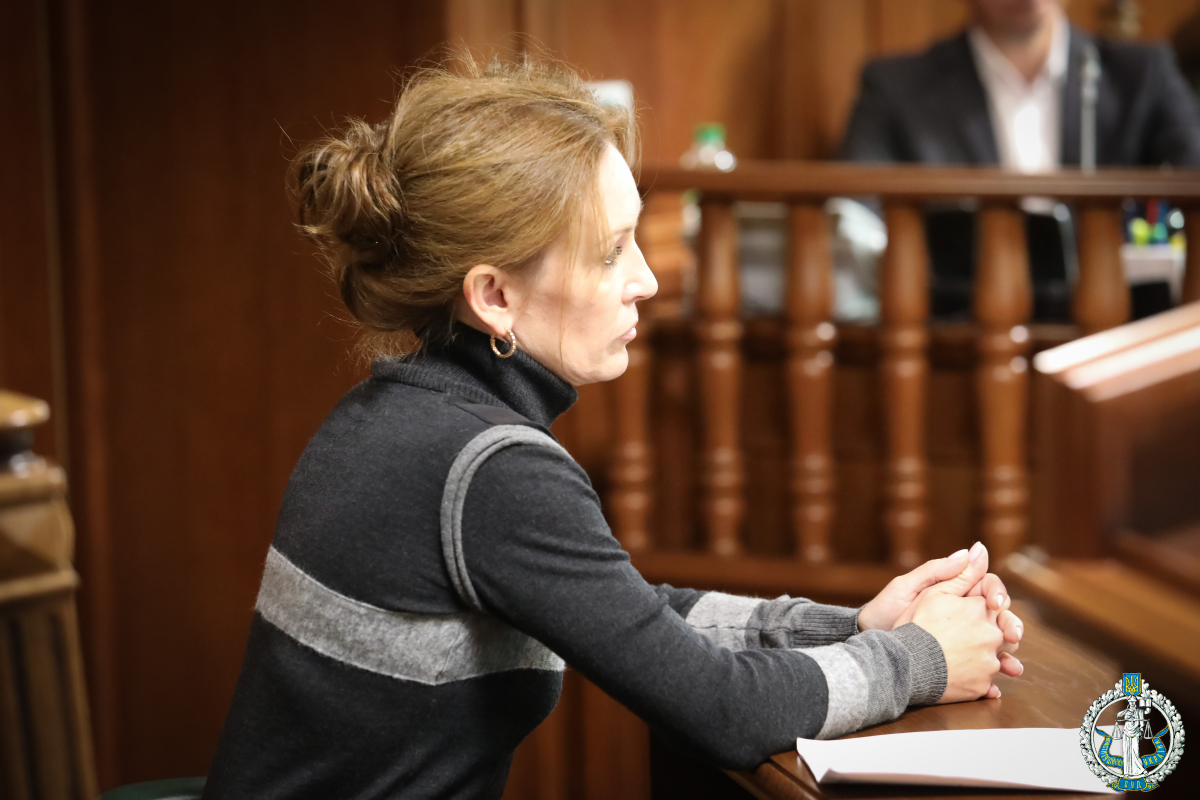On October 18, 2023, the Second Senate of the Constitutional Court of Ukraine, at the public part of the plenary session in the form of written proceedings, deliberated the case upon the constitutional complaint of Yelyzaveta Yevhrafova regarding the constitutionality of specific provisions of paragraph 7 of Section XII “Final and Transitional Provisions” of the Law of Ukraine “On the Judiciary and the Status of Judges” No. 1402-VIII dated June 2, 2016 (hereinafter referred to as “Law No. 1402”).
During the plenary session, the judge-rapporteur in the case Viktor Gorodovenko noted that Yelyzaveta Yevhrafova appealed to the Constitutional Court of Ukraine to verify the compliance of individual provisions of paragraph 7 of Section XII “Final and Transitional Provisions” of Law No. 1402 “in terms of determining the guarantees of judges of the Supreme Court of Ukraine, High Specialized Court on Civil and Criminal Cases, High Economic Court of Ukraine, High Administrative Court of Ukraine until the termination of the activity of these courts by the Law of Ukraine “On the Judiciary and the Status of Judges” No. 2453-VI dated July 7, 2010” with Articles 8.1, 8.2, 19.2, 24.1, 24.2, 41.4, 126.1 of the Constitution of Ukraine
The applicant asserts that after the entry into force of Law No. 1402 dated September 30, 2016, she proceeds with administering justice in the court of cassation, successfully passed the qualification assessment and confirmed her ability to administer justice in the Supreme Court, however receives a judicial remuneration in accordance with the Law of Ukraine “On the Judiciary and the Status of Judges” No. 2453-VI dated July 7, 2010 (hereinafter referred to as “Law No. 2453”).
Yelyzaveta Yevhrafova appealed to the District Administrative Court of the city of Kyiv against the High Specialized Court on Civil and Criminal Cases, in which she asked, in particular, to recognise as unlawful the actions of the High Specialized Court of Ukraine on Civil and Criminal Cases regarding the failure to calculate and pay her a judge's remuneration in accordance with the provisions of Article 135.3.3 of Law No. 1402 (based on the calculation of the official salary of a judge of the Supreme Court), to oblige the defendant to calculate and pay her a judge's remuneration in the appropriate amount, as well as to recalculate the paid judge's remuneration from July 28, 2017, taking into account the payments made.
The District Administrative Court of the city of Kyiv dismissed this claim, and the Sixth Administrative Court of Appeal, applying, in particular, the provisions of paragraph 7 of Section XII “Final and Transitional Provisions” of Law No. 1402, left the said decision unchanged.
Thus, the court of appeal emphasised that by the provisions of paragraph 7 of Section XII “Final and Transitional Provisions” of Law No. 1402, “the legislator specifically singled out the above category of judges, in our case judges of the High Specialized Court of Ukraine on Civil and Criminal Cases, from the circle of persons, which may be subject to the requirements defined by this Law regarding the right to receive a higher judicial remuneration, and regardless of passing a qualification assessment and confirmation of suitability for the position held (the ability to administer justice in the relevant court), the financial support of these judges is determined by the Law of Ukraine “On the Judiciary and the Status of Judges”, which was in effect before Law No. 1402, i.e. before the termination of the activity of the High Specialized Court of Ukraine on Civil and Criminal Cases, the status, structure, powers, work procedure, rights, duties, guarantees of the judges of these courts are determined by the Law of Ukraine “On the Judiciary and the Status Judges” in previous wordings. In view of the circumstances provided, taking into account the stated norms of law, the board of judges agrees with the conclusions of the court of first instance regarding the lack of grounds for satisfying the claims due to the lack of the applicant's right to receive a judge's remuneration, calculated in accordance with Law No. 1402.”
The author of the claim believes that by specific provisions of paragraph 7 of Section XII “Final and Transitional Provisions” of Law No. 1402, she, among other judges of high specialized courts exercising the powers of the cassation instance, was singled out by the legislator in the category of judges who are not granted the guarantees of independence of judges defined by Law No. 1402, in particular the right to judicial remuneration in the amount determined by Article 135 of Law No. 1402, and the right to resign under the conditions established by Law No. 1402.
Yelyzaveta Yevhrafova points out that the disputed provisions of Law No. 1402 “introduce a discriminatory approach to guarantees of independence of judges of high specialized courts, which before the Supreme Court (in its new composition) began to exercise the powers of the cassation instance, which violates the principle of inadmissibility of discrimination, the principle of the unity of the status of judges, constitutional guarantees of their independence”, which contradicts Articles 8.1, 8.2, 19.2, 24.1, 24.2, and 126.1 of the Constitution of Ukraine.
According to the subject of the right to a constitutional complaint, specific provisions of paragraph 7 of Section XII “Final and Transitional Provisions” of Law No. 1402 “deprive” her of the right to receive a judge's remuneration in the amount determined by Article 135 of Law No. 1402, “which constitutes an interference with the right to property (peaceful ownership of property), which is protected by Article 41 of the Constitution of Ukraine and Article 1 of the First Protocol to the Convention on the Protection of Human Rights and Fundamental Freedoms and is the basis for declaring such provisions as unconstitutional”.
The judge-rapporteur also informed that in order to ensure a full and objective deliberation of the case and delivering of a reasoned decision by the Court, he sent requests to a number of bodies of state power and scientific institutions with a request to express positions on the issues raised in the constitutional complaint.
The court examined the materials of the case in the public part of the plenary session and proceeded to the in-camera part for a decision.
Yelyzaveta Yevhrafova, subject of the right to a constitutional complaint, attended the plenary session.
Video recording of the public part of the plenary session is available on the official website of the Court in the section “Archive of Video Broadcasts of Sessions”.




